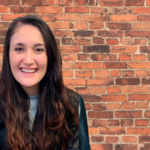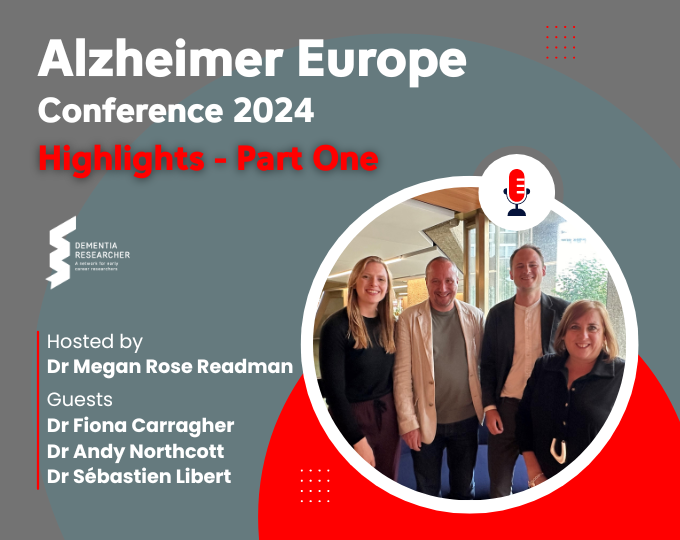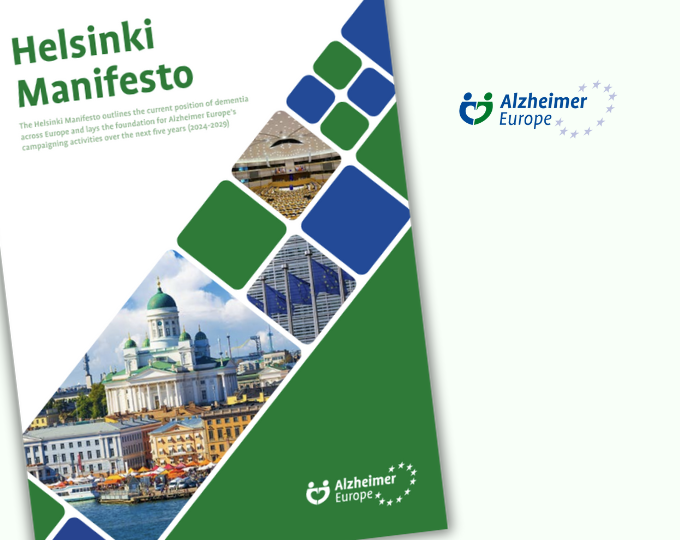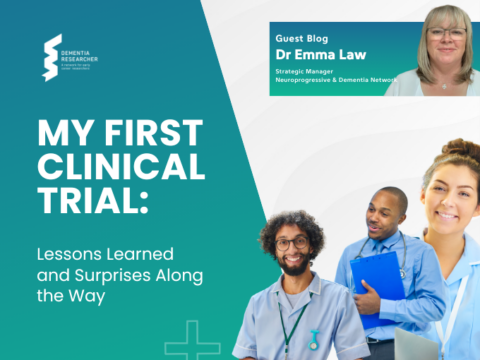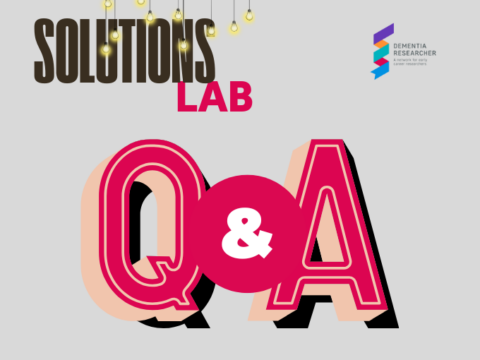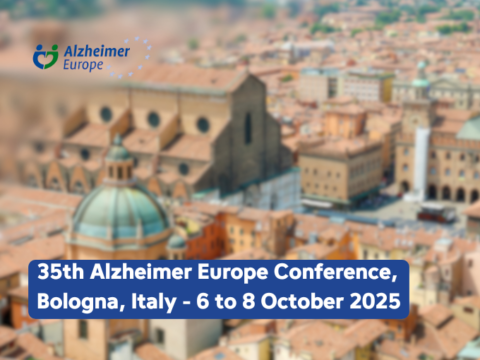Last week Dementia Researcher attended the 34th Alzheimer Europe Conference in Geneva, Switzerland. In this podcast Dr Megan Polden her guests bring you highlights from event, sharing news and their best bits from the hundreds of posters and talks delivered.
Dr Megan Polden talks with Dr Aisling Flynn from Bournemouth University, Dr Emma Law from the Scottish Neuroprogressive and Dementia Network and Dr Lukas Duffner from Alzheimer Europe.
Key topics include the use of artificial intelligence in dementia research, the importance of social health and intersectionality, and the need for greater inclusivity and diversity in research. Our guests emphasise the value of involving people with dementia and their caregivers in research and policy-making, and highlight the emotional impact of hearing personal stories from those affected by dementia. The episode underscores the significance of community engagement, meaningful awareness campaigns, and the benefits of face-to-face interactions at conferences - we hope to see you at the conference next year to share tyour work and build valuable connections.
Voice Over:
The Dementia Researcher podcast. Talking careers, research, conference highlights, and so much more.
Dr Megan Polden:
Welcome to the Dementia Researcher podcast. We're back for part two of our special podcast, bringing you the news and highlights from the Alzheimer's Europe Conference in Geneva. I am Dr. Megan Polden. I'm an NIHR Alzheimer's Society, DEMCOM Research Fellow from the University of Liverpool and Lancaster University, and I'm delighted to be the guest host for part two of these highlight podcasts coming live from Geneva in Switzerland. This is one of my favourite conferences of the year. It brings together people from all areas, not just researchers, but also policymakers and people living with dementia and their caregivers’ advocates, and people who share Alzheimer's Europe's vision of changing perceptions, policy and practise to improve the lives of people affected by dementia. I know my brilliant guests have the passion for this aim as well, so it's my pleasure to introduce. We've got Dr. Lukas Duffner, Dr. Aisling Flynn from Bournemouth University, and Dr. Emma Law from the Scottish Neuro-Progressive and Dementia Network. Hi, everybody.
Dr Lukas Duffner:
Hi.
Dr Megan Polden:
Why don't you all introduce yourselves properly for me?
Dr Lukas Duffner:
My name is Dr. Lukas Duffner and I'm a project officer at Alzheimer's Europe and I joined the Alzheimer's Europe team this year in March. Before that, I was completing my PhD at Maastricht University within the field of Neuroepidemiology, so I did research on dementia, risk reduction, and prevention.
Dr Megan Polden:
That's great. Thank you very much.
Dr Aisling Flynn:
Hi, everyone. My name is Dr. Aisling Flynn. I am a lecturer in Bournemouth University in occupational therapy, and I've just recently completed my PhD, which was focused on the design of a virtual reality social connecting space for people living with dementia. My research interests are very much looking at psychosocial interventions, but also digital technologies and how we can harness digital technologies to support people living with dementia to age well and live well with the condition, but also a real interest in participatory research and how we can meaningfully involve people with dementia and their support persons in research.
Dr Megan Polden:
That's great. Thank you very much. Dr. Emma Law?
Dr Emma Law:
Yes, I'm Dr. Emma Law and I'm not an early career researcher. I have to put my hand up to that. As you can tell, I'm perhaps a long in the tooth researcher, but also not a traditional researcher because I'm not affiliated to a university at the moment at all. I did my PhD in University of Stirling back in 2010 is when I started and finished in 2014. My work was around looking at care homes and did citizenship and inclusion in research make people in care homes feel that sense of citizenship. So, care homes have been a passion for me, and I'm the co-chair of Enrich Scotland with Dr. Susan Shenkin in Scotland. I also am the strategic manager for the Neuroprogressive and Dementia Network in Scotland. The network is about how do we ensure that research is made available to people living in Scotland who have dementia and other progressive illnesses. That's my aim, is how do we include people and make sure that we are inclusive.
Dr Megan Polden:
That's great. Such an important thing in research. That's great. So, thank you so much for introducing yourselves. So now we're going to learn more about the Alzheimer's Europe conference from our experts. Thank you for joining us. So, we're going to discuss our highlights from the Alzheimer's Europe conference. So, Lukas, would you be able to kick us off by talking about one of your highlights from the conference?
Dr Lukas Duffner:
Yes. My first highlight was... This is one of the topics that was highly discussed and that's the use of artificial intelligence within dementia research. It seemed like this was something that was quite apparent at this year's conference, while also in line with the general rise of artificial intelligence and what it can be used for, both in terms of as an asset, but also in terms of possible drawbacks of using artificial intelligence. There was one study that was presented yesterday during a quick oral presentation around by Dr. David Neal from the Free University of Amsterdam about generative AI. They examined how people with dementia are actually depicted, and they then used thematic constant analysis to describe these pictures, and they saw that people with dementia, as opposed to well to the healthy older adults, were depicted as sadder, more things like desperate and also physically frail. This really underlines also the bias that does exist in maybe imposed by generative AI.
Dr Megan Polden:
That's a really interesting talk. I wasn't actually able to go that, so it's nice to hear a really great summary of it. It definitely sounds like it draws on some of the positives of AI and some of the things that can come from it, but also a lot of the drawbacks from it in terms of some of how media depicts it and how that also then feeds into...
Dr Lukas Duffner:
Exactly. This is also one thing that they concluded is that AI obviously is based on what people actually throw into the internet and actually things that people tell and say, and that also really reflects this bias that exists within the more general population.
Dr Megan Polden:
I saw you nodding along in that talk as well.
Dr Aisling Flynn:
It actually clashed with another one, but it was one that I really wanted to go to, but I guess it's looking at how we're training those models, and how those algorithms are being sensitive to and inclusive of the needs of people living with dementia? That picture that they're painting of somebody with dementia as quite a gloomy and negative situation. But actually, can we pull out the positives in that situation when we're depicting those images within AI is really important.
Dr Emma Law:
Likewise, I wasn't at the talk, because I'm here with some colleagues and we discuss what we see in the evening, and one of my colleagues was seeing how striking that particular talk was of the negativity around AI. That's something I hadn't even considered. You think AI is all going to be positive, and this wasn't?
Dr Lukas Duffner:
I found that kind of scary.
Dr Emma Law:
Exactly what he said. He was quite taken aback by that particular talk and the negativity and the scariness and how people perceived older dementia. It was all negative and how awful that was.
Dr Lukas Duffner:
It might be something that it's going to be used also more and more in the future, even though one conclusion by the authors was that it is at this point not necessarily better than just a Google image search.
Dr Emma Law:
Exactly.
Dr Megan Polden:
That's great. That sounds like a really interesting talk then. I'm disappointed that I wasn't able to see it. Would you be able to talk about one of your highlights?
Dr Aisling Flynn:
One highlight for me was Louise Hocker's presentation yesterday, which looked at using a social health and the social health framework as a way of looking at intersectionality and inequalities. I think that was a really important topic and quite a relevant topic and something that has a key thread throughout the conference over the last number of days and the work that they're doing is really fantastic connected with INTERDEM. So, I think that was definitely something that I will take away is how do we define social health and how are we looking at it through that lens of intersectionality, which is so important.
Dr Megan Polden:
Absolutely. That sounds like a really interesting talk as well. Did anyone else wanted to catch that one?
Dr Lukas Duffner:
No, but in general, this intersectionality theme also seems to be quite strong with today's plenary session this morning. It's also something that I personally really, really enjoyed and really liked because it is a very important topic.
Dr Megan Polden:
Definitely. Emma, would you be able to give us one of your highlights?
Dr Emma Law:
One of my highlights was actually the opening ceremony. I don't know if we're supposed to talk about yesterday or the whole act. The opening ceremony because it set the scene so well, for me, the idea of it all being about innovating for dementia but talking about involving underserved groups and the minority ethnic groups and LGBTQ+ and all the kind of involvement that was being talked about at the opening ceremony. For me, I thought, this is going to be good. I thought this is going to be really exciting and it really set the scene well. There was a few of the speakers who really resonated with me. So, for me, the opening ceremony was a real highlight because I felt that that set out how the conference was going to be.
Dr Megan Polden:
I agree. I think it's a lovely tone for the conference and I think it really got everyone even more excited about what they were going to... All the talks and things reset. So, we're going to see over the next few days. I definitely agree with you on that one. Lukas, I'm going to go back around to you again. So, have you got another highlight that you can share with us?
Dr Lukas Duffner:
My second highlight is another theme that seemed to come up quite frequently, and that's the risk reduction and prevention. That's also something that is very close to my heart because this is also where I have my PhD in. It seems like there is some new momentum that might also have to do with the recently published updated report of the Lancet Commission for Dementia Prevention Intervention and Care. So, I saw this slide of modifiable risk factors presented in the report on quite some and quite some presentations here, and it was interesting to see how the risk factors that are being presented and shift and change throughout the years. We compare to Bucharest, for instance, two years ago and also Helsinki last year. There seems to be quite a shift, and this is also nicely reflecting of what has been introduced in the report. For instance, hearing loss, came across in quite some presentations, but also sleep also something that is being... This is not yet included in the report, but being discussed as a potential modifiable risk factor. So, I find this also quite hopeful.
Dr Megan Polden:
There definitely seems to have been quite a big push towards a lot more research into respect over the last few years, and it's definitely something that's really important to really understand those associations and the causality of them or whether there are associations and things like that. There's a lot still to be done, but there's such a good starting point and it's really exciting to hear a lot of the research that's been discussed in the conference.
Dr Aisling Flynn:
I think as well on that point, it's trying to strike a balance between that focus on risk reduction and prevention, but also on the people who are currently living with dementia and what we're doing in the now for those people while they're waiting in hope for something or a new discovery. It's a difficult balance to strike, but I think the conference this year has very much focused on both sides and it's been really, really nice to see that as well.
Dr Megan Polden:
I think as well, we have to be cautious about using the terminology around it as well sometimes in terms of talking about risk factors, especially when they're talking about modifiable ones, because sometimes, even though they're talked about as being modifiable for a lot of people, they're not actually modifiable.
Dr Lukas Duffner:
Of course. People need to have the possibilities to actually, change those risk factors and work on those risk factors. Of course, we want to avoid pointing the finger at people and blaming them.
Dr Megan Polden:
Absolutely. Lots of interesting talks to do with risk factors. I agree. Aisling, I'll go and see you now.
Dr Aisling Flynn:
One of the quick oral presentations before lunch today actually touched on the world Alzheimer report 2024 and the findings from that report. I don't know if it was actually a highlight or something that it was a real takeaway point for me, and I know maybe you've heard similar, looking at your reaction.
Dr Emma Law:
I couldn't get into it because it was so busy. It was in one of the smaller rooms and it was absolutely stowed out. You couldn't get in.
Dr Aisling Flynn:
I wrote down the figures just so I could get them correct, but the report was obviously done in 2019 and then has been re-updated in 2024, and they found that 65% of healthcare professionals believe that dementia is in normal part of ageing, and that figure was 62% in 2019. So actually, there's an increase in those kind of more negative perceptions around dementia, and 80% of the general public believe that dementia is a normal part of ageing, and that was 66% in 2019. So, all of the work and the research that we're doing, I imagined that that figure would've actually come down, but actually it's gone up, and that talk really highlighted the need for dementia awareness and that continuous need for dementia awareness. I thought that was just a really stark figure when I saw it and something that I think it really highlights that although there's been huge research done that we still need to keep going and still need to keep pushing at a community level now.
Dr Megan Polden:
I think that's absolutely right, and I think it's just we do need to just get the word out even more about it and more education on it, like you say at a community level and make sure that we're really disseminating all our research findings with the community and people within the book.
Dr Aisling Flynn:
I think it's meaningful awareness campaigns. So how can we meaningfully involve people with dementia in the co-production of those campaigns, but also that the campaigns and the people that we're targeting within the community, that those campaigns are targeted to their needs, their specific needs, I think is really important. So having a bespoke blanket awareness training is probably not the way to approach something like this, I think, it really needs to be much more targeted.
Dr Megan Polden:
Absolutely. I think that's a really, really good point. Thank you. Emma, would you be able to share your next highlight with us?
Dr Emma Law:
Yes. My next highlight was one of the parallel sessions, and it was Mariana Sattali from Greece, she was talking about raising awareness about dementia in Austrian, German, Greek, and Italian deaf communities. Because part of my work is to try and involve some of the ethnic minority groups, which is what they were talking about, the deaf community, it just hadn't occurred to me. We talk about people becoming deaf or deafness being one of the possible pointers for dementia, but actually how do we involve people who are deaf, who are completely deaf? They were talking about raising awareness and how to use sign language and involving people in dementia friendly ways of doing things by using sign language in these different countries. To me, that was an eye-opener because I hadn't even considered it. It hadn't even come across my radar that we should be involving people who are deaf. I thought, there we go. We need to think about blind people as well. It's just not something that I thought about. So, it really opened my eyes to that area that I hadn't considered.
Dr Megan Polden:
It must be so challenging for people not being included in things like that with research, particularly as well.
Dr Aisling Flynn:
Importance of accessibility and how we're presenting information, making sure that they have a seat at the table.
Dr Megan Polden:
That's a really, really good point. Lukas, we're back to you again. So, another highlight from you, if you don't mind?
Dr Lukas Duffner:
My next title is actually kind of going to the same direction, what Emma just said, the general need for more diversity in research and actually all aspects of research. This nicely ties into a theme of intersectionality of the need for more representativeness and letting people have a seat at the table. There were some presentations actually just now in the quick oral session about recruitment of trial recruitment into how we can actually motivate people to participate more dementia research. So not only clinical trials, but also for instance, care research and what are potential barriers and facilitators for people to take part in a dementia study. One of the big themes that one study by Julian Hirsch from the University of St. Gallen showed was that the social factors are quite important in that really building ties with research participants that go beyond possibly the mere participation in the study. So actually, having also active community outreach and building connections with research participants, maybe this is really also something that can really contribute to including to more inclusivity in research.
Dr Megan Polden:
That's a really good point. It's about building those proper relationships with people within the community for them to once get involved and doing active research continuously.
Dr Lukas Duffner:
I found this quite a nice finding actually.
Dr Megan Polden:
Yeah, it's definitely a good finding.
Dr Lukas Duffner:
It's very, very positive as well.
Dr Aisling Flynn:
In a way, that's not a tick box exercise or is something that's tokenistic. We're all sitting here in quite a privileged position and being able to acknowledge that. I think, it's how we can be inclusive without doing it in a way that we are doing it to say we've been inclusive. I think it's really important, and the only way you can do that is by having that PPI involvement from the very beginning, the initial conceptualization of a piece of work.
Dr Emma Law:
Not doing it as a tick box exercise. So, tick, I've called somebody, so they have to be right at the beginning. We have to be right at the beginning, that's all.
Dr Megan Polden:
Absolutely. I think it is so important to be involving members of the public in all stages of research all the way through and building proper relationships with people as well and having conversations. I think beyond the research and actually building personal connections with people, I think that's really important.
Dr Aisling Flynn:
What's been really nice actually, at the conference, and it's what I love about the Alzheimer Europe Conference is the active involvement with people in people living with dementia and their caregivers in presentations. We can have conversations with them about research at lunch breaks, and it's just lovely to have their presence, even as an early career researcher. I think that's so invaluable to see how they're shaping the policy within Alzheimer's Europe or within Europe with dementia policies, in general, and it's so invaluable to see, and for them to have a presence at the conference is really important.
Dr Lukas Duffner:
Also, for researchers, depending on the field of research, maybe sometimes you're facing more numbers and actually seeing people, and also people living with dementia. So, it is maybe also a nice way of motivating researchers and bringing back this idea of what they're doing this for. Of course, there's also a chance for people with dementia to be actively involved and then engage with researchers.
Dr Megan Polden:
Absolutely. I have to say that's definitely been my highlight of the conference when people in lived experience have spoken. I think the first preliminary session where it was five people, make sure people living with dementia and people who have been affected by dementia through caregiving roles. I think that was really, really hard-hitting, and it really just made you realise why we were all doing it.
Dr Aisling Flynn:
They're the most powerful presentations during the last number of days. I think every year I've been here... This is my third conference I've cried. It's majority, but it's because there's so much emotion behind what people is saying because it's their lived experience. For us, as researchers, we're only going off theory. And a lot of the time we don't have that lived experience of dementia or caring for somebody with dementia. So those primary accounts are so important.
Dr Megan Polden:
Absolutely. It definitely set the tone for me, and I was like, "This is going to be another conference. I'm going to cry again."
Dr Emma Law:
I've shed some tears as well. One that resonated with me, which was the chap who talked about the Sainsbury's. That was amazing.
Dr Megan Polden:
That was a great talk when he was speaking about his experiences with his wife.
Dr Emma Law:
Yes. I suppose for the purpose of the podcast, I don't know if it was spoken about yesterday, but the fact that it was the Sainsbury's manager who he felt was the hero of the day because he'd allowed his wife who had obvious, not a diagnosed problem, but obvious some problem, but he managed to keep her working, and that was just fantastic.
Dr Megan Polden:
I think it really highlighted how one person could have such a strong influence and impact on someone's dementia journey and progression and his caring as well and how it helped him. I think it's lovely to hear those stories where people have gone beyond their roles and its people within the community and kind of putting that emphasis on building that dementia awareness within the community, again, coming back to what we were talking about before and how that can really help support people with dementia to live longer within their communities.
Dr Emma Law:
I was telling him this morning, one of my friend's sons is a very new Tesco manager, and I'm going to speak to him about what I heard because it's so important.
Dr Megan Polden:
Absolutely. So important to be able to support people working for as long as they want to, and it'll be their decision when they decide.
Dr Emma Law:
I've made a slight change that I'm going to hope that he'll take that on board.
Dr Megan Polden:
That's great. I think that's why it's always great to hear stories like that where it's like you're going to take that back now from the conference and hopefully have an impact in your own community. So that's great to hear. Aisling, I'm now going to continue for another highlight from you.
Dr Aisling Flynn:
I think one of the parallel sessions earlier today looked at stigma and discrimination, and there were two really great presentations around intergenerational work that have been done. Again, raising dementia awareness was Jane Gaffey and Phyllis Ferrell. Hopefully I said that okay. Looking at how you can work with youths to overcome stigma, and for me, the main take home message from those two presentations was that children don't know what stigma is, and it's the perfect time to really teach the youth about dementia and about what it is in order to reduce the stigma that we're seeing in society.
Dr Megan Polden:
So, Aisling, back to you. So, would you be able to talk about another highlight that you had, maybe any posters that you've seen at the conference?
Dr Aisling Flynn:
I really enjoyed looking at Lillian Hung's work. So, she's done quite a bit around the use of virtual reality in residential aged care facilities. Again, very much aligned with my own research interests, and the themes that she found from her research around using VR in those settings was the idea of allowing people to get outside of the four walls of the residential aged care facility and actually being able to be immersed in a new environment, in a new world, and that sense of connection that comes with that. Again, I think for me, it very much just makes it clear that the need for more research in virtual reality in that space and something that I definitely want to continue. So, I've actually made that connection now with Lillian, which is great, and I think having that poster exhibition within Alzheimer's Europe is really important because you get that chance to network and those chances to build connections with other researchers is really great opportunity.
Dr Megan Polden:
That's great. That's one of the benefits of us all getting together and building those connections and going on to develop future ideas and everything. So, it's great that you've had lots of opportunities to do that.
Dr Aisling Flynn:
Definitely. I think that's the value of face-to-face conferences. It's something that we lost during COVID with virtual engagement. I think sometimes you need to have that face-to-face interaction with other people. It's so important.
Dr Lukas Duffner:
The coffee chats.
Dr Megan Polden:
A 100%. Definitely. That's great. Emma, would you be able to share another one of your highlights for that?
Dr Emma Law:
One of my highlights, which is something very close to what I'm trying to do about being more inclusive, was the LGBTQ+ community session. So, I'm picking bits out of this session, not any one particular speaker, but some of the things that came across during that was how important the inclusion of LGBTQI+ people in research are. But things like getting pronouns, that was something that came across very strongly and making sure that you use the correct pronouns for people and to be able to engage with people. Again, it's bringing people in right at the beginning.
There was some talk about the transgender and gender division that one of the speakers talked about and how older people with dementia, they're more prone to having things like depression. So how important it's to recognise these risk factors for people who have LGBTQI+ and that they might be more prone to some of these other illnesses as well as dementia. For me, it was such a poignant point somebody made was at the end of a study, so you're really involved and you feel included, and then the way he put it just perfectly, it was dropped like a hot rock at the end of the study and how upsetting that was, having felt included and loved and really part of something, and then project comes to the end. I noticed that was talked about at quite a few of the talks. At the end of project, what happens then?
Dr Aisling Flynn:
The importance of closing that feedback loop.
Dr Emma Law:
Yes, but not just the feedback loop. They felt very included, and then all of a sudden, that projects finished.
Dr Lukas Duffner:
We're through this theme again, of this connection beyond the research participation.
Dr Emma Law:
For me, that was a really interesting talk and it's always one of the most colourful talks of the conference, so I really do enjoy it.
Dr Megan Polden:
I know there's been a lot of talk about that session and a lot of people, it's really found that session to be really beneficial and really quite hard hitting. So, thank you all so much for sharing all of your highlights, and it's been great to hear about them and chat a bit more about your experiences at Alzheimer's Europe conference. So, I have one final question for you all. So, what would you say to anyone who missed out on this year's conference, but who was thinking about joining next year? So, I'll start with you again, Lukas.
Dr Lukas Duffner:
Because it is the best conference there is for getting in touch with your fellow researchers and listening to their nice work and actually connecting with other researchers and people with dementia, the carers, and making some great impact as well.
Dr Megan Polden:
That's great. Thank you so much. Aisling, what would you say to anyone who's thinking about coming next year?
Dr Aisling Flynn:
I think just do it. To be perfectly honest, I think we're really, really lucky that this conference has quite a broad spectrum. We get expertise from early career researchers, right to late-stage career researchers. I think there's something for everybody, and I think the way in which they embed public and patient involvement within the conferences is something really refreshing. I think not a lot of conferences can say that they have that meaningful involvement, and I think that's really lovely for attendees and something that is great to observe.
Dr Megan Polden:
Thank you. Last, but certainly not least, Emma.
Dr Emma Law:
I would suggest that you start thinking about putting in for posters for doing talks. You may be surprised because this year, we put in four applications. We got a 15-minute talk, a five-minute talk, and two posters from the four applications that we put in. So, write about what you're passionate about and you can share it with all these people. A thousand people came, share it with all these people. We're sharing it online there, so wonderful. Does it come next year, Bologna? I think it is. Am I allowed to say that?
Dr Lukas Duffner:
It is Bologna. It's wonderful. It's on the back of your... Not on this one.
Dr Emma Law:
Think about what really excites you in your work and get that poster written or ask for a speaking spot, and you might be surprised.
Dr Aisling Flynn:
For people who are daunted by doing a large presentation that just to segue into conferences through the poster, a quick presentation is much more accessible for people, I think
Dr Lukas Duffner:
That's true. That's also something I really always liked about the Alzheimer Europe conference is that also for early career researchers, researchers approachable here, even if they are seniors. So, it's nice. You're making new contacts also for early career researchers.
Dr Emma Law:
It's great for networking.
Dr Lukas Duffner:
Yes.
Dr Emma Law:
You make all sorts of connections with people.
Dr Megan Polden:
Absolutely. Everyone's so friendly. That's the experience I've had. It's such a lovely experience of a conference and everyone's so lovely and welcoming. So yeah, I've had a great time as well to say. So, I'm afraid that that's all we have time for today. But if you just can't get enough of this topic, please visit the Dementia Researcher website where you'll find a full transcript and biographies on our guests that we've had here today. You'll also find blogs and much more on this topic as well. So, I would like to thank our incredible guests, Lukas, Aisling, and Emma. I'm Megan Polden and you've been listening to the Dementia Researcher podcast. Bye.
Dr Aisling Flynn:
Bye.
Voice Over:
The Dementia Researcher podcast was brought to you by University College London with generous funding from the UK National Institute for Health Research, Alzheimer's Research UK, Alzheimer's Society, Alzheimer's Association, and Race Against Dementia. Please subscribe, leave us a review and register on our website for full access to all our great resources, dementiaresearcher.nihr.ac.uk.
If you would like to share your own experiences or discuss your research in a blog or on a podcast, drop us a line to dementiaresearcher@ucl.ac.uk
Did you know... you can find our podcast in your favourite podcast app on mobile devices, and our narrated blogs are also available as a podcast.
The views and opinions expressed by the host and guests in this podcast represent those of the guests and do not necessarily reflect those of UCL or Dementia Researcher

 Print This Post
Print This Post